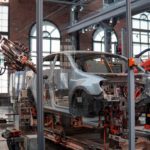 Do higher wages drive automation? Economic theory says yes. When labor costs rise, businesses look for ways to cut expenses, often by investing in new technology. A new study from the University of Zurich (UZH) provides strong evidence that this is true.
Do higher wages drive automation? Economic theory says yes. When labor costs rise, businesses look for ways to cut expenses, often by investing in new technology. A new study from the University of Zurich (UZH) provides strong evidence that this is true.
The researchers combined two datasets to explore the link between wages and automation. The first tracked automation patents using European patent records, allowing them to measure innovation in machine tools, textile machinery, and paper machines—industries where automation is common.
The second dataset covered wages in 41 countries, focusing on firms that compete globally. By looking at wage changes, the researchers could see whether rising labor costs led to more automation.
Rising costs
“Our method helped us pinpoint how wage increases drive technological change,” the researchers said.
Their findings were clear. A 1% rise in wages led to a 2% to 5% increase in automation-related innovation. But not all wages had the same effect. Higher pay for low-skilled workers pushed businesses to automate, while higher pay for high-skilled workers had the opposite effect. Skilled workers are needed to install and run automation, so when their wages rise, automation becomes less attractive.
Germany’s Hartz labour market reforms from 2003 to 2005 illustrate this. These policies increased the supply of workers and lowered wages, especially for low-skilled jobs. According to the study, this led to less investment in automation among German firms.
Unintended consequences
The takeaway is simple: wage policies influence business decisions about automation, shaping productivity, employment, and economic growth. Policymakers considering minimum wage hikes or labor reforms should keep this in mind.
Interestingly, wage changes did not affect other types of innovation, like energy efficiency improvements. The researchers suggest further study on how rising wages for high-skilled workers impact new automation technologies, especially artificial intelligence.
As wages rise, businesses will continue looking for efficiency gains. Whether policymakers encourage or slow this trend is up to them.